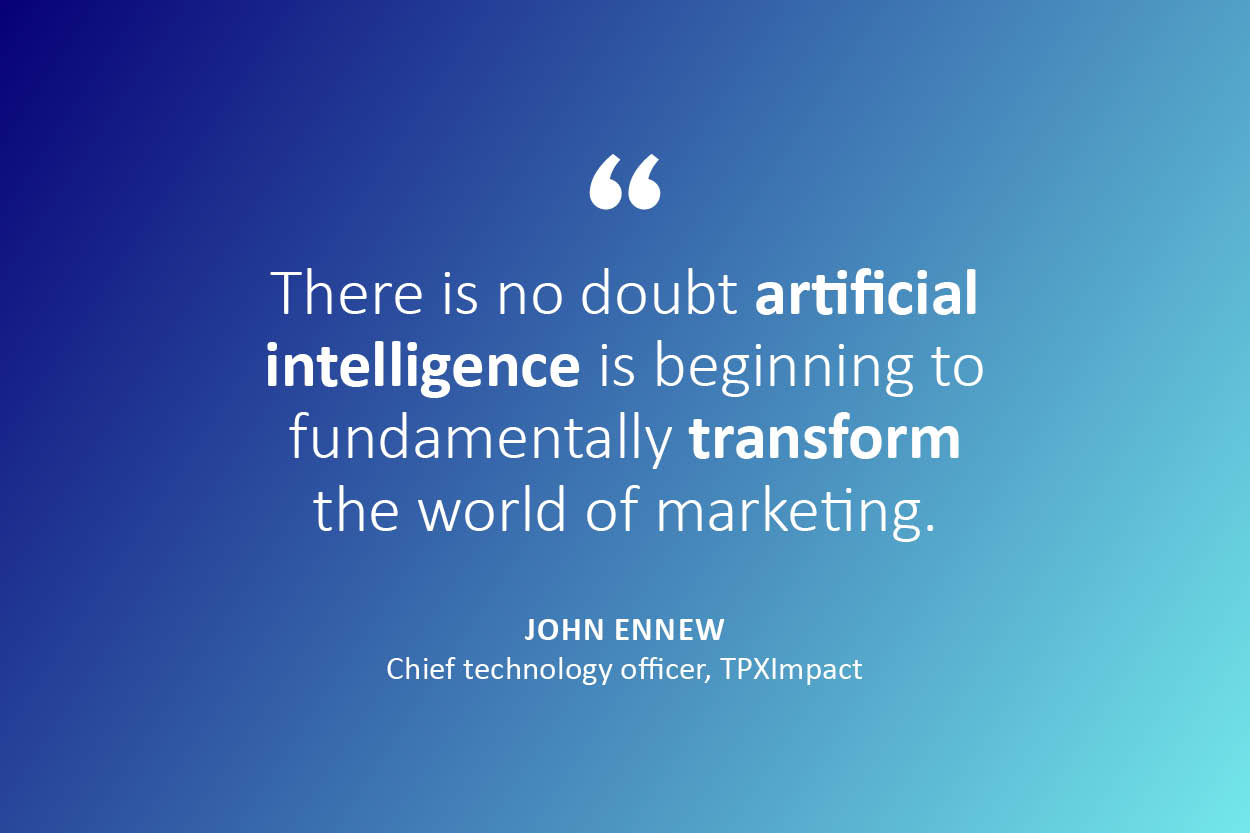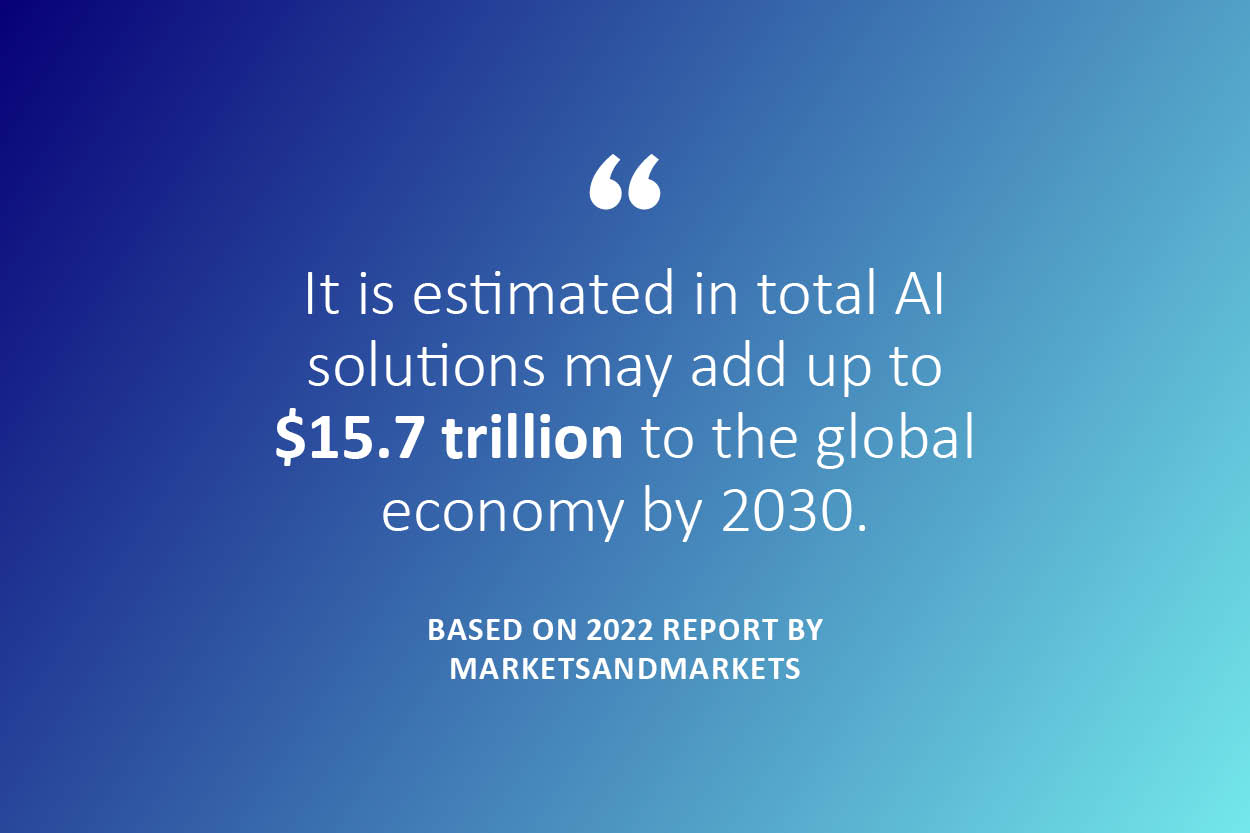How can CMOs successfully incorporate AI into their marketing strategy?

- 16 May 2023
Emerging technologies such as AI present a plethora of new challenges and opportunities to businesses. But before they are adopted into an organisation’s marketing strategy, the implication on both the customer and employee day-to-day experience must be considered. John Ennew, chief technology officer at TPXimpact, is here to explain how to incorporate AI into a marketing strategy ensuring a positive experience for all stakeholders.
Ever since ChatGPT took the internet by storm late last year, marketing and sales departments from around the world have been rushing to create AI strategies that will help them capitalise on the newest breakthroughs in the field.
With large brands such as Coca-Cola announcing that they will be using AI to create campaigns, and Meta and Google working on developing automated advertising tools, there is no doubt that Artificial Intelligence is beginning to fundamentally transform the world of marketing, digital experience and advertising.
According to the 2023 AI Marketing Benchmark Report, 61.4% of marketers have used AI in their marketing activities before. While the rapid industry uptake of breaking-edge language models, image generators and other AI-powered tools has generated exciting business opportunities, blunders like the recent Bard launch that cost Google $100 billion prove just how important it is that businesses do not lose sight of potential risks associated with new technologies.

As the race to AI heats up, it is vital that CMOs and other leading decision-makers consciously set time aside to consider how their businesses can best take advantage of new tools and avoid potential pitfalls, instead of letting themselves be swept up in the AI hype.
If you’re looking for a more in-depth view of the emerging technologies impacting the marketing and business landscape, secure your place now on our Digital Marketing Emerging Technologies short course.
How can marketers use AI in their everyday jobs?
The potential applications of Artificial Intelligence in the field of marketing are vast. On the one hand, advanced algorithms can be integrated into highly creative processes, for example by using them to generate images or banners that can serve as inspiration for new campaigns. On the other, AI can be used to automate processes in a marketing department that are more mundane, or else, time-intensive in nature.
Where analysing data from hundreds or even thousands of customers can be a time-consuming and exceedingly complicated process if conducted manually, AI models are becoming ever more proficient at generating data-led insights in a fast and efficient manner. By interpreting a large amount of data points, AI models can even predict future customer behaviour or personalise the messages used in advertisements and email marketing.

It is estimated that in total, AI solutions may add up to $15.7 trillion to the global economy by 2030, but - as all new technologies do - they also come with certain risks. With some workers in creative industries worried that AI may soon cost them their jobs, and advanced algorithms raising concerns around potential D&I issues, businesses must ensure that both their employees and customers are on board when introducing new technology.
How can brands bring employees along with them on their AI journey?
There’s no one-size-fits-all solution when it comes to effectively integrating AI into a company’s marketing strategy. Leaders that allow employees from across the organisation to get directly involved in discussing new strategies and approaches create an important forum for workers to air potential concerns, as well as discuss their team’s core aims and how AI might help to achieve them.
Before adopting new marketing strategies supported by AI, it is also vital that employees receive the training they need to be able to successfully integrate new technologies into their day-to-day jobs. This involves giving marketing practitioners time to learn about the fundamental mechanics underlying AI models, as well as providing guidance on how to use specific tools.
Beyond this, marketing leaders must also carefully assess the level of digital maturity their organisation is currently operating at. In many cases, organisations need to break down existing data silos and create functional internal reporting systems before they are capable of unlocking the full power of AI.
Considering the customer’s perspective: How can AI tools create positive experiences for all users?
According to Deloitte, 62% of customers are open to companies using AI if it can significantly improve processes and the level of service they receive. While AI tools are certainly capable of boosting customer satisfaction, for example by creating personalised digital experiences that are tailored to a user’s specific needs, this may not always be the case.
Models that are trained on biased data or developed by teams that are unrepresentative of wider society run the risk of only serving the needs of certain customer groups, neglecting those of others. From both an ethical and a commercial standpoint, marketing teams must therefore set out clear ethical standards and diversity and inclusion goals, before picking up new tools or even creating their own AI models.
While automation stands to enhance customer experiences in many cases, there may be instances where providing a ‘human touch’ is necessary to ensure user trust. This is exemplified by the Cyber Helpline’s customer service approach during the pandemic. Faced with an increased number of cyber-crime victims asking for support at a time when access to call centres was limited, the Cyber Helpline partnered with digital consultancy TPXimpact to develop their own chatbot.
Cybercrime victims were able to receive fast and personalised support from the new chatbot, but could also turn to human volunteers to seek advice. This allowed staff to concentrate on the most complex and high-demand cases.
Embracing the winds of change
The opportunities presented by AI in the fields of marketing, advertising and digital experience are both vast and exciting. Marketing leaders should use this time where AI is still in its infancy to invest in training, consider the ethical implications of emerging technologies and develop a tailored AI strategy based on their organisation’s goals.
This will not only help them to make their future marketing strategies more creative and aligned to customer’s individual preferences, but give them a long-term advantage compared to other businesses who may be getting swept away with the excitement surrounding flashy new AI tools - or worse - burying their heads in the sand during these times of rapid technological advancement.
If you’re looking for a more in-depth view of the emerging technologies impacting the marketing and business landscape, secure your place now on our Digital Marketing Emerging Technologies short course.

- 0 views

 FAQs
FAQs
 Log in
Log in
 MyCIM
MyCIM






